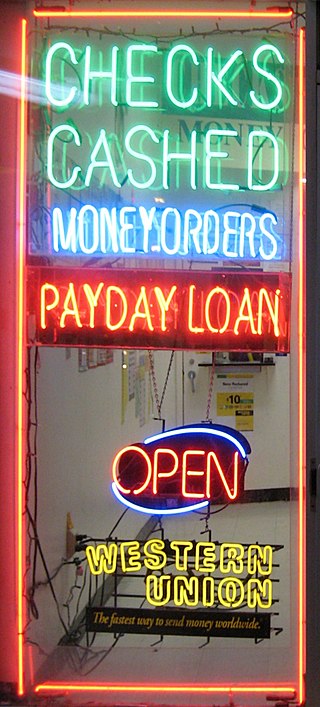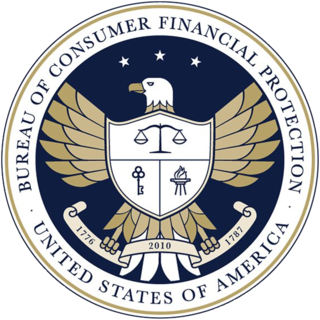The Federal Trade Commission Act of 1914 is a United States federal law which established the Federal Trade Commission. The Act was signed into law by US President Woodrow Wilson in 1914 and outlaws unfair methods of competition and unfair acts or practices that affect commerce.

The Federal Trade Commission (FTC) is an independent agency of the United States government whose principal mission is the enforcement of civil (non-criminal) antitrust law and the promotion of consumer protection. The FTC shares jurisdiction over federal civil antitrust enforcement with the Department of Justice Antitrust Division. The agency is headquartered in the Federal Trade Commission Building in Washington, DC.

A payday loan is a short-term unsecured loan, often characterized by high interest rates.

The Fair Debt Collection Practices Act (FDCPA), Pub. L. 95-109; 91 Stat. 874, codified as 15 U.S.C. § 1692 –1692p, approved on September 20, 1977, is a consumer protection amendment, establishing legal protection from abusive debt collection practices, to the Consumer Credit Protection Act, as Title VIII of that Act. The statute's stated purposes are: to eliminate abusive practices in the collection of consumer debts, to promote fair debt collection, and to provide consumers with an avenue for disputing and obtaining validation of debt information in order to ensure the information's accuracy. The Act creates guidelines under which debt collectors may conduct business, defines rights of consumers involved with debt collectors, and prescribes penalties and remedies for violations of the Act. It is sometimes used in conjunction with the Fair Credit Reporting Act.
Predatory lending refers to unethical practices conducted by lending organizations during a loan origination process that are unfair, deceptive, or fraudulent. While there are no internationally agreed legal definitions for predatory lending, a 2006 audit report from the office of inspector general of the US Federal Deposit Insurance Corporation (FDIC) broadly defines predatory lending as "imposing unfair and abusive loan terms on borrowers", though "unfair" and "abusive" were not specifically defined. Though there are laws against some of the specific practices commonly identified as predatory, various federal agencies use the phrase as a catch-all term for many specific illegal activities in the loan industry. Predatory lending should not be confused with predatory mortgage servicing which is mortgage practices described by critics as unfair, deceptive, or fraudulent practices during the loan or mortgage servicing process, post loan origination.
Restitution and unjust enrichment is the field of law relating to gains-based recovery. In contrast with damages, restitution is a claim or remedy requiring a defendant to give up benefits wrongfully obtained. Liability for restitution is primarily governed by the "principle of unjust enrichment": A person who has been unjustly enriched at the expense of another is required to make restitution.

Credit counseling is commonly a process that is used to help individual debtors with debt settlement through education, budgeting and the use of a variety of tools with the goal to reduce and ultimately eliminate debt. Credit counseling is most often done by Credit counseling agencies that are empowered by contract to act on behalf of the debtor to negotiate with creditors to resolve debt that is beyond a debtor's ability to pay. Some of the agencies are non-profits that charge at no or non-fee rates, while others can be for-profit and include high fees. Regulations on credit counseling and Credit counseling agencies varies by country and sometimes within regions of the countries themselves. In the United States, individuals filing Chapter 13 bankruptcy are required to receive counseling.
Debt settlement is a settlement negotiated with a debtor's unsecured creditor. Commonly, creditors agree to forgive a large part of the debt: perhaps around half, though results can vary widely. When settlements are finalized, the terms are put in writing. It is common that the debtor makes one lump-sum payment in exchange for the creditor agreeing that the debt is now cancelled and the matter closed. Some settlements are paid out over a number of months. In either case, as long as the debtor does what is agreed in the negotiation, no outstanding debt will appear on the former debtor's credit report.

Movieland, also known as Movieland.com, Moviepass.tv and Popcorn.net, was a subscription-based movie download service that has been the subject of thousands of complaints to the Federal Trade Commission, the Washington State Attorney General's Office, the Better Business Bureau, and other agencies by consumers who said they were held hostage by its repeated pop-up windows and demands for payment, triggered after a free 3-day trial period. Many said they had never even heard of Movieland until they saw their first pop-up. Movieland advertised that the service had "no spyware", and that no personal information would need to be filled out to begin the free trial.
Disgorgement is defined by Black's Law Dictionary as "the act of giving up something on demand or by legal compulsion."
The Community Financial Services Association of America (CFSA) is a trade association in the United States representing the payday lending industry.
Consumer protection is the practice of safeguarding buyers of goods and services, and the public, against unfair practices in the marketplace. Consumer protection measures are often established by law. Such laws are intended to prevent businesses from engaging in fraud or specified unfair practices in order to gain an advantage over competitors or to mislead consumers. They may also provide additional protection for the general public which may be impacted by a product even when they are not the direct purchaser or consumer of that product. For example, government regulations may require businesses to disclose detailed information about their products—particularly in areas where public health or safety is an issue, such as with food or automobiles.
Federal Trade Commission v. Sperry & Hutchinson Trading Stamp Co., 405 U.S. 233 (1972), is a decision of the United States Supreme Court holding that the Federal Trade Commission (FTC) may act against a company's “unfair” business practices even though the practice is none of the following: an antitrust violation, an incipient antitrust violation, a violation of the “spirit” of the antitrust laws, or a deceptive practice. This legal theory is termed the "unfairness doctrine."
FTC v. Dean Foods Co., 384 U.S. 597 (1966), is a 1966 decision of the United States Supreme Court holding that the Federal Trade Commission (FTC) may sue in federal court to obtain a preliminary injunction to maintain the status quo against the consummation of a merger that the agency persuasively contends violates the antitrust laws.

Scott Tucker is an American convicted racketeer, loan shark, former businessman and amateur racing driver.
In re Gateway Learning Corp, 138 F.T.C. 443 File No. 042-3047, was an investigatory action by the Federal Trade Commission (FTC) of the Gateway Learning Corporation, distributor of Hooked on Phonics. In its complaint, the FTC alleged that Gateway had committed both unfair and deceptive trade practices by violating the terms of its own privacy policy and making retroactive changes to its privacy policy without notifying its customers. Gateway reached a settlement with the FTC, entering into a consent decree in July 2004, before formal charges were filed.

The Consumer Financial Protection Bureau (CFPB) is an agency of the United States government responsible for consumer protection in the financial sector. CFPB's jurisdiction includes banks, credit unions, securities firms, payday lenders, mortgage-servicing operations, foreclosure relief services, debt collectors, and other financial companies operating in the United States. Since its founding, the CFPB has used technology tools to monitor how financial entities used social media and algorithms to target consumers.
Payday loans in Canada are permitted under section 347.1 of the Criminal Code, so long as the province of the borrower has enacted sufficient provincial legislation concerning the provisioning of payday loans. In the event that no such provincial legislation exists payday loans are limited by usury laws, with any effective (compound) rate of interest charged above 60% per annum considered criminal. However, so far this has not been enforced by Newfoundland and Labrador.
In addition to federal laws, each state has its own unfair competition law to prohibit false and misleading advertising. In California, one such statute is the Unfair Competition Law ("UCL"), Business and Professions Code §§ 17200 et seq. The UCL "borrows heavily from section 5 of the Federal Trade Commission Act" but has developed its own body of case law.
Tanzin v. Tanvir, 592 U.S. ___ (2020), was a United States Supreme Court case involving legal remedies that could be sought by litigants against federal officials for violations of the Religious Freedom Restoration Act of 1993. In a unanimous decision issued December 10, 2020, the court ruled that the Act allowed for litigants to seek not only injunctive relief but also monetary damages.







